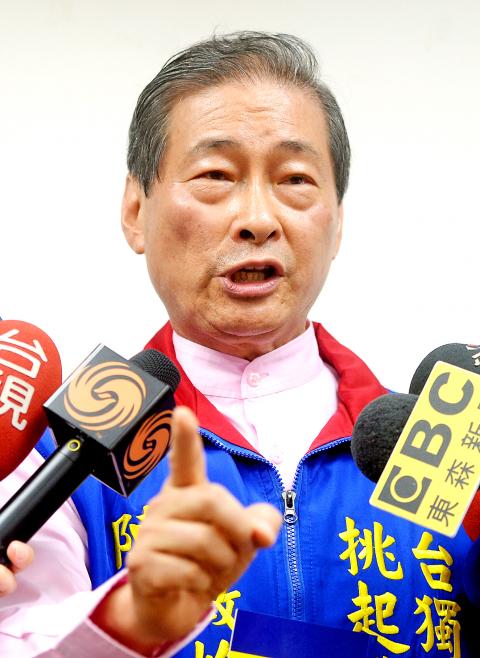Chinese Unity Promotion Party (CUPP) Chairman An-le (張安樂) announced that the party is breaking ties with the pro-unification Concentric Patriotism Association (CPA) and asked all CUPP members to stop interacting with the association.
“The CPA, with members from vastly different backgrounds and its esoteric vision, is problematic,” Chang — a former gangster known as the “White Wolf” — said on Facebook on Friday evening.
“Its behavior has been shortsighted, opportunist and counterproductive to the goal of achieving peaceful unification between the two sides of the Taiwan Strait,” he said. “Comrades of the party should immediately cease any interaction with the CPA. Those who contravene this rule will face disciplinary measures.”

Photo: Lin Cheng-kung, Taipei Times
The announcement came one day after news broke about the CPA reportedly paying people to wave Chinese flags and threatening independence supporters.
In a 25-minute documentary aired by Qatar-based al-Jazeera TV earlier this month, CPA executive director Zhang Xiuye (張秀葉) told an undercover reporter who infiltrated the association that it paid people between NT$800 and NT$900 per day to wave the national flag of the People’s Republic of China.
Zhang told the reporter that it is illegal to take money from China, but it is legal to accept money from China-based Taiwanese businesspeople, such as CPA head Zhou Qinjun (周慶峻), who she said would often receive “special care” from the Chinese government.
Furthermore, Zhou was shown telephoning a police officer and requesting a list of Taiwanese independence supporters in his precinct.
In the documentary, Zhou said that he wanted to send a warning to people who supported independence, vowing to “come after them.”
The Mainland Affairs Council on Thursday said it would closely monitor the CPA’s operations, while the CUPP has been under investigation for allegedly receiving funding from Beijing to carry out destabilizing activities to promote unification with China.

MAKING WAVES: China’s maritime militia could become a nontraditional threat in war, clogging up shipping lanes to prevent US or Japanese intervention, a report said About 1,900 Chinese ships flying flags of convenience and fishing vessels that participated in China’s military exercises around Taiwan last month and in January have been listed for monitoring, Coast Guard Administration (CGA) Deputy Director-General Hsieh Ching-chin (謝慶欽) said yesterday. Following amendments to the Commercial Port Act (商港法) and the Law of Ships (船舶法) last month, the CGA can designate possible berthing areas or deny ports of call for vessels suspected of loitering around areas where undersea cables can be accessed, Oceans Affairs Council Minister Kuan Bi-ling (管碧玲) said. The list of suspected ships, originally 300, had risen to about 1,900 as

Japan’s strategic alliance with the US would collapse if Tokyo were to turn away from a conflict in Taiwan, Japanese Prime Minister Sanae Takaichi said yesterday, but distanced herself from previous comments that suggested a possible military response in such an event. Takaichi expressed her latest views on a nationally broadcast TV program late on Monday, where an opposition party leader criticized her for igniting tensions with China with the earlier remarks. Ties between Japan and China have sunk to the worst level in years after Takaichi said in November that a hypothetical Chinese attack on Taiwan could bring about a Japanese

Right-wing political scientist Laura Fernandez on Sunday won Costa Rica’s presidential election by a landslide, after promising to crack down on rising violence linked to the cocaine trade. Fernandez’s nearest rival, economist Alvaro Ramos, conceded defeat as results showed the ruling party far exceeding the threshold of 40 percent needed to avoid a runoff. With 94 percent of polling stations counted, the political heir of outgoing Costa Rican President Rodrigo Chaves had captured 48.3 percent of the vote compared with Ramos’ 33.4 percent, the Supreme Electoral Tribunal said. As soon as the first results were announced, members of Fernandez’s Sovereign People’s Party

MORE RESPONSIBILITY: Draftees would be expected to fight alongside professional soldiers, likely requiring the transformation of some training brigades into combat units The armed forces are to start incorporating new conscripts into combined arms brigades this year to enhance combat readiness, the Executive Yuan’s latest policy report said. The new policy would affect Taiwanese men entering the military for their compulsory service, which was extended to one year under reforms by then-president Tsai Ing-wen (蔡英文) in 2022. The conscripts would be trained to operate machine guns, uncrewed aerial vehicles, anti-tank guided missile launchers and Stinger air defense systems, the report said, adding that the basic training would be lengthened to eight weeks. After basic training, conscripts would be sorted into infantry battalions that would take